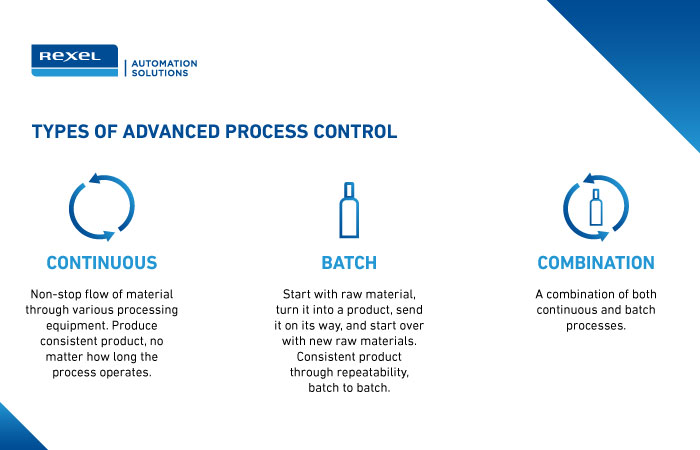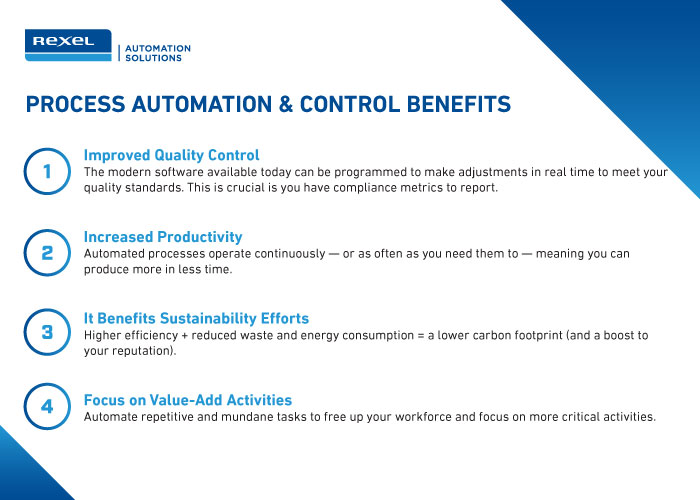
Blog > Automation > Understanding Process Automation & Advanced Process Control
Understanding Process Automation & Advanced Process Control
5/24/23 | Claire Felix-Davies, Process Solutions Manager

Blog > Automation > Understanding Process Automation & Advanced Process Control
5/24/23 | Claire Felix-Davies, Process Solutions Manager
The names sound simple enough, right? Process automation and advanced process control mean automating the processes of your plant and having the tools to control them to best suit your needs. While the names might sound simple, there’s a lot that goes into it, some specifics to know, and benefits you may not be aware of. It’s no secret that the world is already a massively digital space, so it’s become critical for industrial manufacturers to invest in process automation and advanced process control tools to stay competitive – But what does that mean?
Although implementing process automation and advanced process control as part of your digital transformation strategy can be an involved undertaking – there are a ton of resources available. But, first, let’s dive into the basics.
Related post: 5 Reasons to Start Your Digital Transformation NOW
What is Process Automation?
Process automation, much like the name suggests, involves using technologies such as sensors, controllers, and software to control and monitor your industrial processes. This includes, but isn’t limited to, production and testing. By automating these processes, you can improve quality and consistency, increase output, meet regulatory compliance, and lower costs while improving the efficiency of your operations and reducing the risk of human error – freeing up those humans to focus on other priorities.
Advanced Process Control gives you control and monitoring of continuous and batch processes using technology and instrumentation that is key to managing all the variables associated with process automation.

Indeed, there are. Here are three primary ones:
This is the non-step flow of materials through various processing equipment. The equipment performs one dedicated function that rarely shuts down and is not dependent on the length of time of the operations. The goals of this process are to produce a consistent product no matter how long the process operates.
Examples of this include glass, cement, water/wastewater treatment, combustion control, and steel.
Batch process starts with a raw material, which are then produced/processed and sent off – then the process starts over again with new raw materials. This typically consists of one or more step(s) that must be performed in a defined order and involve finite quantities of raw materials that are produced into finite quantities of the finished product. There are often multiple variations of the final product, and the overall goal is to produce a consistent product through repeatability – batch to batch.
Examples of this include beer, ice cream, household products, pet food, pharmaceuticals, and chemicals.
The third type of advanced process control is for manufacturers who use a combination of continuous and batch processes.

Process is everywhere, but the key industries who benefit most from advanced process control include:
Here are four of them – but the list goes far beyond that.
Quality over quantity, right? Investing in process automation tools and technology allows you to do both. The modern software available today can be programmed to monitor and adjust various production parameters in real time and make sure they meet certain standards. Not only do you save time and money, but you now also have comprehensive data, reporting, and monitoring available to you across multiple devices. This is crucial if you have compliance metrics to report.
A major benefit of investing in process automation is increased productivity. Automated processes operate continuously – or as often as you need them to – meaning you can produce more in less time and better meet the needs of customers without having to sacrifice quality or put your employees’ wellbeing at risk.
Related Post: Sleep Better with a Process Controller
As a bonus, process automation can help you reduce your environmental impact. Improved efficiency means less waste, reduced energy consumption, and a lower carbon footprint. Not only does this benefit you, but it’s also environmentally responsible, and customers are looking to do business with companies that prioritize sustainability – so you’ll enjoy that boost to your reputation while also benefitting the environment.
Not only is the human brain incapable of multitasking, it’s also not good for people or businesses. Why have your team(s) focus on two things when they can put all their focus on one critical activity? By automating repetitive and mundane tasks, you can free up your workforce to focus on more complex and value-added activities. Not only does this improve the bottom line and keep the business moving forward, but it can also improve job satisfaction and reduce the risk of burnout.
Recommended Resource: Consider the PlantPAx® system

Investing in process automation technology can help you improve efficiency, productivity, and quality while also promoting sustainability efforts, and there is no shortage of solutions available. As global markets continue to face growing challenges, you’ll be able to stay competitive. Ready to find the solutions that are best for you? Contact our team of experts today!